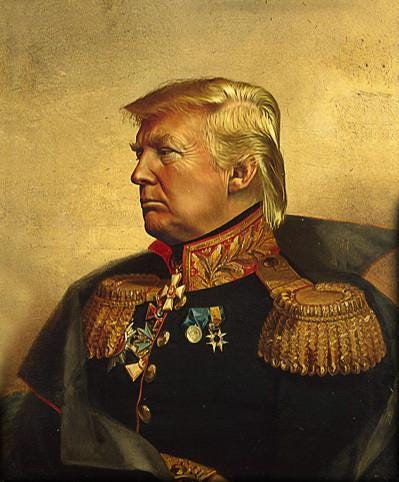Trump, Charlemagne, and Nostalgia

Donald Trump is a lot like Charlemagne (the great medieval emperor), just not in the ways that one might think. Instead, the comparison has everything to do with nostalgia and narrative, with creating a past for himself he hopes will transcend the truth. During his inauguration as President, Daniel Dale from The Toronto Star talked to a number of people who’d come out for the event, asking them why they supported (now-President) Trump and then posting their responses on Twitter. According to these supporters, Trump was a “man of faith,” who was loved for his “honesty” and “selflessness,” and who is “always willing to admit when he’s wrong.” Yet, his religious beliefs are not necessarily complementary with the religious right, according to Poltifact, Trump’s statements have only scored 16% as “true” or “mostly true,” and there’s almost no evidence that he’s given almost anything to charity, as the reporting of David Farenthold has shown. So, none of those things his supporters said are objectively true. Yet, the portrait his supporters have painted seems to them more “true” (alt-true?) than any individual, objective facts. The explanation for why this is has to do with nostalgia and narrative.

The Frankish king Charlemagne died in 814 AD. His accomplishments were amazing by any standard, having rebuilt schools, reformed religion, and conquered his enemies to create an empire that stretched from the Pyrenees to modern Poland and from southern Denmark south to beyond Rome. But his accomplishments only grew after his death. His foundations multiplied, his reforms grew more sweeping, his empire expanded. By the 12th century, for example, everyone “knew” Charlemagne had launched the first “crusade” to take Jerusalem from the Muslims. This never happened but, for the monks and nobles of western Europe during the 12th century it was widely accepted, repeated in Latin chronicles, Old French Romances, and commemorated in stained glass at Chartres cathedral. It took until 1935 (!) to definitively prove Charlemagne did NOT go to the Holy Land. This is the power of nostalgia. It creates narratives, generates its own version of “truth” that has little relation to reality.

During his lifetime, Charlemagne consciously created the conditions under which his later legend would flourish. He and those around him concocted a narrative — a story — of who he and what his empire was. Their narrative made it so that the pieces seemed to naturally fit together; he was a champion of Christianity and a conqueror so “of course” his realm extended to Jerusalem. Quickly, nostalgia became history. After his death, later texts looked to these original sources for what had happened. Everything reinforced everything else’s claims. It created an echo chamber that only amplified the message as the centuries passed. Its origins became shrouded and alternative versions of events muted. From time to time, new facts surfaced that contradicted this claim but they still couldn’t dethrone the narrative that nostalgia had created. The whole picture of Charlemagne, including his imagined conquests, just “made sense” as part of a whole.
Trump supporters such as those interviewed by Daniel Dale live in this same intellectual world, on the precipice of nostalgia. The impressions his supporters have formed are not “made up” or “imagined.” Those impressions are based on a consciously cultivated profile that Trump has crafted over the years — the shrewd businessman who appeared on the hit TV show The Apprentice (despite his numerous bankruptcies), who creates jobs with all his real estate developments (despite stiffing contractors repeatedly), who has been born again and holds Jesus in his heart (despite his often fumbling relationship with Christianity), etc.
Trump has, like Charlemagne, created a narrative of himself. Particularly since adding Steve Bannon and Roger Ailes to his court, that narrative is repeated again and again within the echo chamber of Breitbart and Fox News. It’s a narrative with huge tensile strength, one that individual fact-checks can’t break. The narrative is too coherent to his core supporters. The world is a certain way (dangerous), he is a certain type of person (a problem-solver). That, for them, is a truth that transcends reality.

The only way to defeat this move towards nostalgia is to systematically attack the narrative itself. People want coherence, not a series of what can seem to be disconnected facts. They need someone to knit those facts into meaning. Although it took more than 1000 years to finally prove Charlemagne didn’t go to Jerusalem, his exclusively positive reputation cracked long before that. In the 13th century, the French king and his nobles waged a war over the memory of Charlemagne. His royal authority was reinterpreted as tyranny, his conquests not his but the result of his brave warriors, his piety a facade for incestuous relations with his daughter. The French kings held to that triumphal nostalgia, but their nobles raised up an alternative narrative using new sources and different readings of accepted stories. They insisted, as we must now, on the centrality of the truth value (not the truth claim) of those stories about the past. This allowed them to construct a new narrative, to disrupt nostalgia.
The stakes are high here. Nostalgia has a tricky way of making people do things. After all, one of the chroniclers of the First Crusade said that Christians, inspired by a speech that called upon them to act like their ancestor Charlemagne, marched through the Balkans “following the same route that Charlemagne… once followed on his pilgrimage to Constantinople” in order to fight a holy war against Islam.
